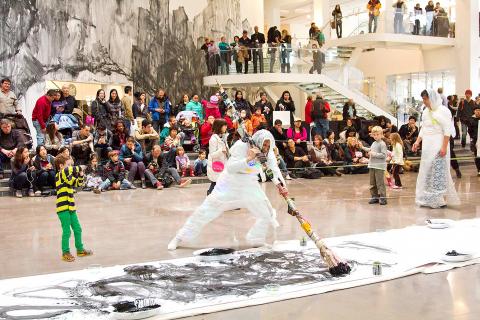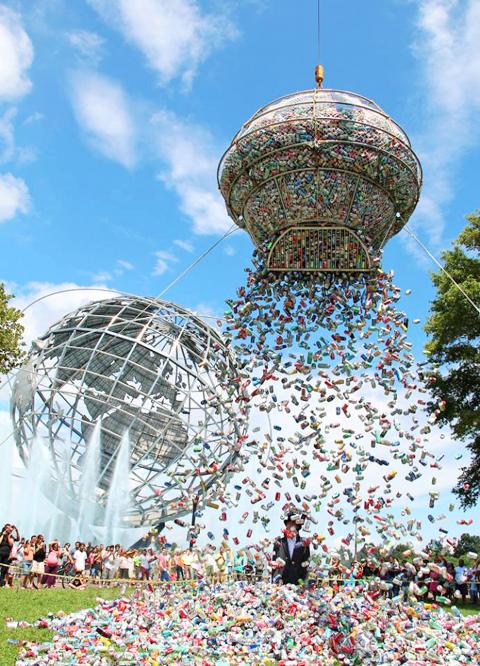As if it weren’t enough to have 30,000 aluminum cans dropped on his head, Yang Chin-chih (楊金池) performed the feat twice — first in 2012 in New York and two years ago in Taipei.
“The New York performance wasn’t so bad, but it was raining in Taipei and the cans were full of water,” the New York-based multidisciplinary performance artist says. “They also dropped [too many] at once. I could barely stand, my head was in constant pain.”
Entitled Kill me or Change, the piece was part of Yang’s efforts to highlight environmental issues, as he estimates that the average person would use and discard about 30,000 cans in his or her lifetime.

Photo courtesy of Yang Chin-chih
The performance is featured in filmmaker Huang Ming-chuan’s (黃明川) full-length documentary about Yang’s work and life, Face the Earth (肉身搏天), which will make its Taiwan premiere on Saturday at the Chiayi International Art Doc Film Festival (嘉義國際藝術紀錄影展), which runs until April 1. Yang will be available for a post-screening discussion.
The film is not completely new to Taiwanese cinephiles, as a short version made it into the top 10 in the 2014 New Taipei City Documentary Film Awards (新北市紀錄片獎). Yang says while he focuses on both environmental issues and social issues caused by new technology, Huang’s film focuses on the former as well as Yang’s multiple surgeries to fix the left side of his face, which was paralyzed after he suffered a mini-stroke during his compulsory military service.
“I wasn’t sure about being in a documentary, but Huang told me that his films are often used for educational purposes. So is my art — I want more people to know that we should protect our environment,” he says.

Photo courtesy of Yang Chin-chih
Yang moved to New York in the early 1980s to study at Parsons School of Design. After graduation, he worked a number of jobs to support his art, including a stint at Benihana restaurant, where the chefs perform culinary acrobatics and tell jokes to entertain diners.
“That was my first public performance,” Yang laughs.
He remained in New York, but his name made it back to Taiwan in 2007 when he was questioned by the FBI for driving around New York, projecting the Taiwan flag and other independence-related symbols on the UN building and other locations such as China’s US consulate.
Yang became interested in environmental issues when he visited a paper recycling plant about 20 years ago. He noticed how many chemicals were used in the process and how recycled paper is more expensive than regular paper.
“I realized that recycling is not enough,” he says. “I think our financial system and economic structure must change. We need to stop mass producing and create quality products that last longer.”
As an example of his explorations of how technology affects humans, in Invisible Love and Beauty Yang took an ancient communication tool — a giant calligraphy brush made of natural material — and adorned it with wires, cell phones and other modern devices. He then asked people to call the phones so they would ring while he painted.
Yang says his art usually contains many components, and Kill Me or Change is more than a single act of dropping cans. For example, he enlisted more than 100 people to help him collect the cans over several years. Many were purchased from homeless can collectors around New York City, and he also asked children he taught at public school art classes bring him cans.
Through this interaction, Yang’s message of environmental protection reaches a larger audience than is present at the performance.
“My art used to be very traditional,” he says. “But I feel the need to keep up with changes in society. The change I can effect in society is limited as an artist, so I have to make my art more interactive and work with more and more people.”

In the March 9 edition of the Taipei Times a piece by Ninon Godefroy ran with the headine “The quiet, gentle rhythm of Taiwan.” It started with the line “Taiwan is a small, humble place. There is no Eiffel Tower, no pyramids — no singular attraction that draws the world’s attention.” I laughed out loud at that. This was out of no disrespect for the author or the piece, which made some interesting analogies and good points about how both Din Tai Fung’s and Taiwan Semiconductor Manufacturing Co’s (TSMC, 台積電) meticulous attention to detail and quality are not quite up to

April 21 to April 27 Hsieh Er’s (謝娥) political fortunes were rising fast after she got out of jail and joined the Chinese Nationalist Party (KMT) in December 1945. Not only did she hold key positions in various committees, she was elected the only woman on the Taipei City Council and headed to Nanjing in 1946 as the sole Taiwanese female representative to the National Constituent Assembly. With the support of first lady Soong May-ling (宋美齡), she started the Taipei Women’s Association and Taiwan Provincial Women’s Association, where she

Chinese Nationalist Party (KMT) Chairman Eric Chu (朱立倫) hatched a bold plan to charge forward and seize the initiative when he held a protest in front of the Taipei City Prosecutors’ Office. Though risky, because illegal, its success would help tackle at least six problems facing both himself and the KMT. What he did not see coming was Taipei Mayor Chiang Wan-an (將萬安) tripping him up out of the gate. In spite of Chu being the most consequential and successful KMT chairman since the early 2010s — arguably saving the party from financial ruin and restoring its electoral viability —

It is one of the more remarkable facts of Taiwan history that it was never occupied or claimed by any of the numerous kingdoms of southern China — Han or otherwise — that lay just across the water from it. None of their brilliant ministers ever discovered that Taiwan was a “core interest” of the state whose annexation was “inevitable.” As Paul Kua notes in an excellent monograph laying out how the Portuguese gave Taiwan the name “Formosa,” the first Europeans to express an interest in occupying Taiwan were the Spanish. Tonio Andrade in his seminal work, How Taiwan Became Chinese,